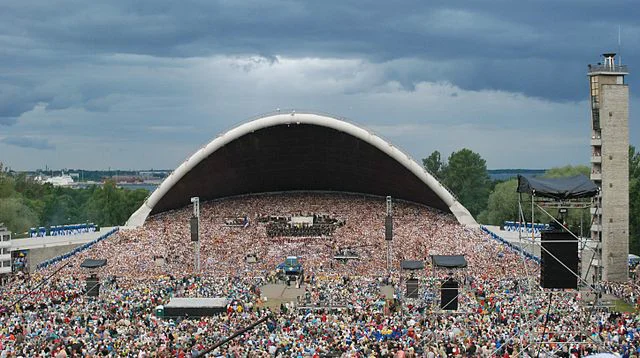Peaceful stances against unequal civil rights have been successful throughout history and nonviolent movements can lead to meaningful systemic change. Reflecting back on several landmark moments can act as a guide for action in these tumultuous times to gain equality for all lives in society.
Take Action: Check Your Voter Registration Status With 'Just Vote' Here
Here are five peaceful protests which led to positive social, and political changes.
The Salt March
During the transition between the wet to dry season of 1930 Mahatma (Mohandas) Gandhi led a peaceful protest against Britain’s imposed law dictating no Indian could collect or sell salt in the country. Followed by dozens, Gandhi walked over 240 miles leading protesters to the Arabian Sea to pick up a small handful of salt out of the muddy waters of the sea.
Seventeen years later, after this peaceful yet defiant act, India gained independence from Britain.
“Nonviolence is an intensely active force when properly understood and used.” – Mohandas Gandhi
Suffrage Parade
This message, “To ask for freedom is not a crime,” still holds true today. Peaceful protests like the 1913 Suffrage Parade shared the voices of over 5,000 courageous women speaking out for the right to equal political participation. This protest can remind us peaceful acts have the power to change the system.
“We are here, not because we are law-breakers; we are here in our efforts to become law-makers.” - Emmeline Pankhurst
Delano Grape Boycott
Cesar Chavez advocated for peaceful boycotts, protest, and a grueling yet nonviolent 25-day hunger strike which led to legislative changes to end exploitative abuse of America’s farm workers in the late 1960s. He led a five-year strike in Delano, Calif., bringing together over 2,000 farmers to demand minimum wage primarily for underpaid overworked Filipino farmworkers. This caused more than 17 million Americans to boycott California grapes, which helped secure unions, better wages and security for farmworkers.
“I am convinced that the truest act of courage, the strongest act of humanity, is to sacrifice ourselves for others in a totally non violent struggle for justice.” - Cesar Chavez
Montgomery Bus Boycott
There are times when one person’s peaceful actions can bring about more change than anyone can imagine. Rosa Parks’ refusal to give up her seat to a white passenger on a bus in Montgomery, Ala., is one such example. Her defiant act symbolized greater civil rights, spreading the message that all people deserve equal seats. The U.S. Supreme Court ruled a year later in 1956, segregation on public buses unconstitutional.
“People always say that I didn't give up my seat because I was tired, but that isn't true. I was not tired physically, or no more tired than I usually was at the end of a working day. I was not old, although some people have an image of me as being old then. I was forty-two. No, the only tired I was, was tired of giving in.” — Rosa Parks
Singing Revolution

Music and social activism have long been “partners in [nonviolent] crime.” During the Singing Revolution, Estonia literally sang its way out of the rule under the Soviet Union. In 1988, more than 100,000 Estonians gathered for five nights to protest Soviet rule. This was known as the Singing Revolution. For Estonians, music and singing acted as a way to preserve culture while the small but fierce country held it’s own during invasion from Germany, Sweden, Denmark and others. In 1991, after decades of Soviet rule, a country with just 1.5 million people regained it’s independence.
“Land of my fathers, land that I love / I’ve given my heart to her / I sing to you, my supreme happiness / My flourishing Estonia!” - lyrics from Mu Isamaa, On Minu Arm
Share these example of change as a reminder that peaceful protests work. Real political, social change stems from acts of nonviolence. While media bombards us with stories of bloodshed, the true spotlight should be on those standing together today asking for equality for all.
What do Global Citizens do? They #shOwup. Regardless of where you're from, what you do for a living, or what your background is: We all #shOwup for something. We're showcasing Global Citizens and letting them explain why they #shOwup every day. Please join the movement and show and tell us why you #shOwup on Facebook, Twitter, and/or Instagram! Did we mention our hashtag, #shOwup? ;) Be sure to use it and tag @glblctzn.